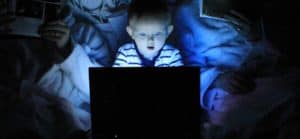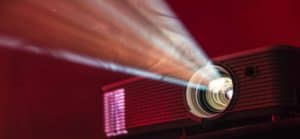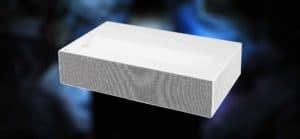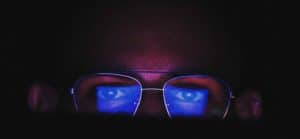 Are you among the many people who use a projector regularly for work or school? If so, you may wonder are projector lights harmful to your eyes.
Are you among the many people who use a projector regularly for work or school? If so, you may wonder are projector lights harmful to your eyes.
Projector lights are often brighter than standard light bulbs, making them seem more harmful. However, there is no scientific evidence to suggest that projector lights are more dangerous to your eyesight than other types of light.
While there is no evidence that projector lights are harmful, it is still essential to take precautions to protect your eyesight. If you use a projector regularly, make sure to take breaks every 60 minutes or so to give your eyes a rest.
It would be best if you also tried to position the projector so that the light is shining directly onto the screen and not into your eyes.
Are Projector Lights Harmful: Can Projectors Hurt Eyes?
Can a Projector Light Damage or Harm Your Eyes?
If the light bulb falls directly into your eye, you risk injuring it. If the projection on the screen falls onto your eye, you could also damage your eyesight. However, these injuries are not expected.
The brightness of the projector light may cause temporary discomfort to your eyes, but it will not cause long-term damage. If you experience discomfort, blinking frequently or using eye drops can help.
You might develop tired eyes from watching movies or TV shows on your projector. However, this habit is diminished if you watch the film from a safe distance instead of up close.
There are no known dangers to your eyesight from projectors as of now – but always exercise caution!
How can Projector Light Damage Your Eyes?
As with any bright light, you were looking at a projector for an extended period can cause eye fatigue. The brightness of the projector light may cause temporary discomfort to your eyes, but it will not cause long-term damage.
If you experience discomfort, blinking frequently or using eye drops can help. You might develop tired eyes from watching movies or TV shows on your projector. However, this habit is diminished if you watch the film from a safe distance instead of up close.
There are no known dangers to your eyesight from projectors as of now – but always exercise caution! However, if you use a projector regularly, make sure to take breaks every 60 minutes or so to give your eyes a rest. It would help if you also tried to position the projector so that the light is shining directly onto the screen and not into your eyes.
The only way that projector light can really damage your eyes is if you decide to stare directly into the lens. Since the UV rays and radiation have to bounce off of the walls for us to be able to see it, the effects of the light are greatly reduced.
How do eyes work?
All parts of the eye come together to help an individual be able to see.
For starters, light is filtered through the cornea, which is the clear front layer of the eye. The cornea is dome shaped and bends light in an effort to help the eye focus. Some light comes through the eye in an opening titled the pupil (pronounced P- U-Pul). The iris is the part of the eye that has control over how much light is let in.
After this process, light passes through the clear inner part of the eye titled the lens. The lens ad cornea work together to focus the light correctly on the retina.
When the light hits the light sensitive layer at the back of the eye titled the retina, photoreceptors, special cells in the eye, turn light into electrical signals.
These signals travel from the retina using the optic nerve, part of the eye that relays messages from the eyes to the brain to create visual images, and reach the brain. The brain then turns these signals into images.
*Side note: The two types of photoreceptors responsible for vision are cones and rods.
Infrared and Ultraviolet Radiation
We know, the term radiation comes with negative connotations – keep in mind though, that radiation is everywhere. The sun, for instance, emits radiation in the form of infrared and UV light. The projection you have emits radiation as well. Infrared and UV light can damage the photoreceptors in the back of the eye.
Like the organ, skin, on sunny days, these 2 types of radiation can damage the cells in the body. Take sunburns for instance. Being exposed to Infrared and UV light for too long can damage the skin – the same can be said for eyes.
The light emitted from projectors, however, doesn’t have the same effect on the eyes. Projectors reflect the light from the lens onto the wall or a screen – they also do so over long distances as well.
The factors mentioned above make it so that projector light doesn’t contain the infrared and UV light mentioned above. Remember to remember that if you look directly into the lens you won’t get the filtration and diffusion that you receive when the light is reflected from the wall or a screen and viewed over a distance. This means that projector light is really only dangerous if you stare directly into the lens.
Do projectors emit blue light?

Some projectors do emit a small amount of blue light. However, the amount of blue light emitted is much less than that from a computer or mobile device screen. Blue light has been shown to cause eye fatigue, so if you are concerned about the blue light emitted by your projector, you can purchase eyeglasses that block blue light.
If you have ever stared at a computer screen for any amount of time, then you may have experienced eye fatigue or strain. This is typically caused by the blue light that computer screens emit. High energy blue light is what typically causes harm to the eyes though. High energy visible light can be found in the 415-455 nanometer band of visible light.
The damage caused by HEV light falls into the UV-intense light category. The UV radiation is what can damage your eyes. Don’t fear though, most of the light is reflected off of screens or walls so the blue light seen is minimal. If you do decide to stare at a projector screen for a long period of time, you may want to wear blue light filtering lenses and take breaks when possible.
How to Protect Your Eyes when Using a Projector?
There are a few simple methods to minimize the risk of harm if you don’t want to lose an eye.

- Watch children and pets: Kids and pets are attracted to bright light and moving images. If you’re using a projector in your home, make sure that any children or pets in the room are supervised to avoid any accidental eye injuries.

2.Position projector correctly: The further away you position the projector from your screen or wall, the dimmer the light will be. Try to place the projector so that the light is projected at a downward angle, reducing the brightness.

3. Use lower settings: If your projector has different settings for brightness and contrast, make sure to use the lowest possible setting that still gives you a clear image. By reducing the amount of light emitted from the projector, you’ll also reduce the risk of eye damage.

4. Take breaks: If you’re looking at a screen for an extended time, make sure to take regular breaks. Looking at a bright light for too long can cause eye strain, so it’s important to give your eyes a rest every 20 minutes for 20 seconds.

5. Use a laser projector: If you’re concerned about the health risks associated with projector lights, you can always switch to a laser projector. These projectors use lasers instead of traditional light bulbs, which emit much dimmer light.

6. Blue light glasses: If you’re going to be using your projector for an extended period of time, you might want to consider investing in a pair of blue light glasses. These glasses help filter out the harmful blue light emitted by projector lights, reducing your risk of eye damage.

7. Never Look at The Projector Lens: The projector’s lens is the brightest part of the light, and looking directly at it can cause instant eye damage. Always cover the lens when the projector is not in use.
These are a few simple tips that can help to reduce the risk of harm from projector lights. If you have any concerns about your eyesight, consult with an eye doctor.
How Does Blue Light Damage Your Eyes?
Blue light is a wavelength of light in natural sunlight and artificial sources, including lightbulbs, computer displays, and televisions.
This type of light has shorter wavelengths than other colors and is scattered more easily. This means that when you are exposed to blue light, more of it reaches the back of your eye, where the retina is located.
Exposure to blue light can cause damage to the retina, resulting in changes in vision and potential problems with eye health. This is because blue light penetrates the eye more deeply than other colors and can disrupt the natural sleep cycle. Additionally, blue light has been linked to an increased risk of macular degeneration, a leading cause of blindness.
While exposure to blue light is not likely to cause immediate damage to your eyes, it is important to be aware of the long-term risks associated with this type of light. To protect your eyesight, it is recommended that you reduce your exposure to blue light as much as possible.
This can be done by avoiding using electronic devices before bed, using screen filters, and wearing sunglasses that block blue light.
What Can We Do to Cut Back on Blue Light Exposure?
Take Breaks: You can do several things to reduce your exposure to blue light. If you work at a computer all day, try to take breaks every 20 minutes or so to look at something else 20 feet away for 20 seconds, which will help reduce eye strain.
Limit time in front of projector: It’s also important to limit your screen time in general and avoid using electronic devices in the evening. You can do this by shutting down your electronics an hour before bed or utilizing software such as f.lux, which changes the color of your screen to reduce blue light exposure.
Wear blue light filtering glasses: Finally, you can protect your eyesight by wearing sunglasses that block blue light. Look for sunglasses with a “blue blocker” label or that are described as blocking both UVA and UVB rays.
Don’t use bright screens before bedtime: Try not to look at bright screens at least 2 hours before bedtime. Many devices nowadays come with a night shift feature, that shift the colors on the screen to a warmer hue. Using this feature will help you limit the amount of blue light your screen emits.
The Effects of Direct or Indirect Light Sources on Eye Health
While blue light is the most harmful type of light for eye health, all kinds of light can be damaging if you are exposed to them for extended periods. This includes both direct and indirect light sources.
Direct light sources emit light directly into your eyes, such as the sun or a flashlight. Indirect light sources reflect light into your eyes, such as a computer screen or television.
Are Projector Light Harmful: The Bottom Line
So there you have it! A comprehensive guide Are Projector Lights Harmful For Your Eyes. We hope this has helped you better understand the risks associated with blue light exposure and what you can do to reduce your risk.
3 Ways to Improve Your Eyesight
Are Projector Light Harmful: Related FAQs
Are Projector Christmas Lights Safe?
There is no evidence to suggest that projector Christmas lights are any more harmful to your eyesight than other types of light. They can be a great way to decorate your home during Christmas. Projection Christmas lights are available in various colors and styles, so you can find the perfect set to complement your home’s decor.
Is Projector Better Than TV for Eyes?
Yes, watching projections is better for your eyes than staring at a TV screen, and this is because the light from a projector is less intense than the light from a TV.
TVs give off a greater quantity of blue light than projectors, which might cause more harm to your eyes over time.
Do projectors emit UV light?
Some projectors do not emit UV light. This is because the light from a projector is created by shining a laser or LED onto a screen, and the light from a projector is not intense enough to produce UV rays.
Do star projectors hurt your eyes?
Most star projectors use LED bulbs, emitting very little UV light, which means that they are unlikely to cause any damage to your eyes. However, it is always a good idea to take breaks from looking at any bright light, including star projectors, to avoid eye strain.
